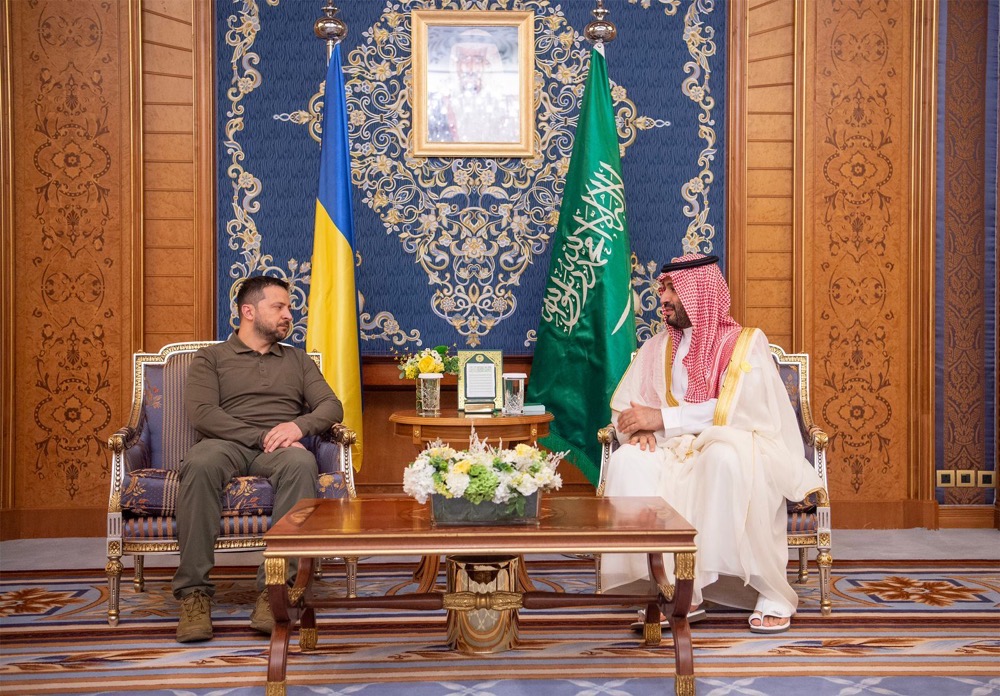RIYADH: The world is moving closer to a peace summit, but an end to the conflict with Russia can only be achieved if Ukraine’s peace plan is adhered to, Dmytro Kuleba, the Ukrainian minister of foreign affairs, has told Arab News.
In an exclusive interview, conducted via Zoom, Kuleba said it was “premature” to discuss specific locations or dates for a global summit, but said the dialogue is moving in the right direction — provided the Ukrainian peace formula is implemented.
Senior officials from 42 countries met in Saudi Arabia’s Jeddah on August 5 and 6 in an attempt to draft key principles on ending war with Russia. The summit followed a similar forum in Copenhagen, Denmark, earlier this summer.
“Following the meeting in Jeddah, I can conclude that we’re definitely moving in that direction at a good pace and this is going to happen,” Kuleba said. “We are working hard with Saudi Arabia and other countries involved in arranging this summit, proposed by Ukraine.
“And the deliverable of this summit is very clear — that the peace formula of Ukraine, which is a comprehensive way to solve the conflict, will deliver, and all of the issues covered by this peace formula will begin to be implemented.
“This is the only way forward based on the UN Charter and international law.”
Volodymyr Zelensky, the Ukrainian president, has said he is hopeful that the diplomatic initiative will lead to a peace summit of world leaders in the autumn to endorse the principles, based on his own 10-point formula for a settlement.
He first presented the blueprint at the G20 summit in Bali, Indonesia, last November.

“Following the meeting in Jeddah, I can conclude that we’re definitely moving in that direction at a good pace and this is going to happen,” Kuleba said. (SPA)
It covered nuclear safety, food and energy security, the release of prisoners, the restoration of territory, the cessation of hostilities, accountability for war crimes, environmental safety, the prevention of future aggression, and confirmation of war’s end.
For its part, Russia’s Foreign Ministry spokeswoman Maria Zakharova recently commented that Moscow appreciated the “mediating and humanitarian initiatives” of friends of Russia, but reiterated her country’s rejection of Ukraine’s “peace formula.”
“By promoting Zelensky’s formula, the Kiev regime and the West are attempting to belittle the great importance of peace initiatives proposed by other countries and to monopolize the right to their advancement,” she told a press conference last week.
The Jeddah meeting concluded without a closing press conference, but the Kingdom has maintained its desire to serve as a neutral intermediary between Russia and Ukraine. On Tuesday, the Saudi Cabinet described the Jeddah summit as a continuation of the Crown Prince’s initiatives and efforts to contribute to the achievement of a lasting peace and reducing the impact and humanitarian impact of the crisis.
At the Copenhagen meeting in June, Ukraine’s demand that all Russian troops withdraw before peace talks could start was seen by some participating countries as an unrealistic demand.
Russia, which controls swathes of Ukrainian territory, including Crimea and parts of Donetsk and Luhansk, has said any negotiations need to take into account the “new territorial realities.”
Asked whether this means the positions of the two nations are irreconcilable, Kuleba said Ukraine had “truth” on its side.
“From all perspectives, legal and political and economic and also historical, Russia must respect Ukraine’s territorial integrity within its internationally recognized borders,” he said.
“Its borders were recognized by Russia, as well as by the rest of the world, including Saudi Arabia and other countries. So the difference between our position and the position of Russia is that our position is legitimate and the Russian position is illegitimate.

Assistant Editor in Chief of Arab News Noor Nugali spoke with Ukraine’s Dmytro Kuleba in an exclusive interview. (AN photo)
“And the truth in this case is on our side. So why should we not be pursuing the truth?”
Commenting on the Jeddah summit, Kremlin spokesman Dmitry Peskov had said “any attempt to promote a peaceful settlement deserves a positive evaluation.”
Asked whether this was a sign that Russia might be open to alternative avenues to peace, Kuleba said Kyiv does not trust Moscow’s words — only actions.
“I think it would be premature and naive to make any conclusions from one comment of the spokesperson of President Putin,” said Kuleba.
“On different occasions, not only him but also other senior Russian officials have stated that the Russian aggression against Ukraine will continue until Russia meets the objectives of this aggression.
“So, we do not trust Russian words. We want to see specific Russian actions and deeds on the ground to draw a conclusion that they are willing to restore peace. As of now, this does not seem to be the case.”
Arab News reached out to the Russian Embassy for comment, but was unsuccessful.
Kuleba acknowledged the prominent role Saudi Arabia has played in efforts to resolve the Ukraine crisis, starting from the prisoner swap it brokered in September 2022 to Zelensky’s address to the Arab League in Jeddah in May this year and, most recently, as the host of this month’s summit.
“I believe Saudi Arabia has been playing a very constructive role in the matters related to the Russian aggression against Ukraine,” he said.

"When Russia unlawfully attacked Ukraine and installed the blockade of Ukrainian sea export of grain. This was illegal and unlawful, by definition,” Kuleba said. (AP)
“We understand that your leadership has recognized an opportunity for Saudi Arabia to play a truly global, constructive role in international politics.
“And I can only commend the vision and the leadership of your country in these matters because to solve global problems, you need global ambition. Saudi Arabia has clearly demonstrated that it has the ambition.
“As a result, it has also demonstrated it has the capacity to deliver, which can only be welcomed and commended.”
Ukrainian officials have lately shifted their diplomatic emphasis toward building support beyond Kyiv’s core Western backers by reaching out to the countries of the Global South.
Commenting on why Ukraine suddenly views the Global South as such an important constituency, Kuleba said many of these nations had suffered as a result of Russia’s aggression.
“Although the Russian aggression against Ukraine takes place in Europe, it has global repercussions and it’s the countries of the Middle East, of Asia, of Africa, of South America, who feel the consequences of the Russian aggression,” said Kuleba.
“This is why it is important to have all of these countries on board in a joint effort to end this conflict, to ease pressure on our economies, on global food security and, of course, to restore respect for international law, which is in everyone’s interest.”
Asked whether he believes nations like Turkiye, India, Indonesia, South Africa, Brazil and even China have sufficient incentives or influence to convince the Kremlin to change course, Kuleba said it would be a gradual process, but one that is moving in the right direction.
“If I look at the list of the countries who took part in the similar meeting of national security advisers and representatives of foreign ministries in Copenhagen slightly more than a month ago, and then at the follow-up meeting in Jeddah, I see that the number of countries participating is growing — including China, who joined the format for the first time — which speaks for the very simple fact that they do see value and their incentive is growing,” he said.
“It doesn’t happen in a day but the overall dynamics of this process is positive. And I would like to once again thank Saudi Arabia for playing a very constructive role in helping other countries to join the process and to realize their interests in this process.”
Kuleba said it was the collective voice of the Global South, as opposed to individual nations, that would ultimately bring Russia to the table.

(Saudi Arabia) has the capacity to deliver, which can only be welcomed and commended, Kuleba said. (AFP)
“If you take China, they enjoy a special relationship with Russia,” he said. “If you take Turkiye, they have a very deep relationship with Russia. If you take Saudi Arabia, you can say the same.
“So, perhaps every country acting on its own doesn’t have a sufficient amount of energy that could make Russia change its position. But if you take all of these countries together, the cumulative effect on Russia can be a game changer.
“And that is the purpose, to bring together everyone who is willing to change the situation for the good. Because together we can stop this war, we can implement a peace formula and restore Ukraine’s territorial integrity, in the interests of the entire international community.”
There are nevertheless concerns among countries of the Global South about jeopardizing ties with Russia by siding with Ukraine. Indeed, even NATO itself seems unsure of how far to go in antagonizing Russia, refusing to offer a clear path for Ukraine to join the military alliance.
“I think these are two separate tracks,” said Kuleba. “Ukraine is steadily moving toward its integration into the EU and NATO for economic and security reasons. This is a very natural choice for our country, given our history and geography.
“Countries of the Global South have lost a lot as a result of the Russian aggression against our country. But this has nothing to do with our aspirations to become members of the EU or NATO.
“What countries of Asia, Africa, Middle East and South America want to see are stable global food markets, prospects of trade with Ukraine, and tapping the full potential of education for their students in Ukraine. All of these functioned perfectly before Russia attacked.
“So, I don’t have the impression that the countries of the world see the situation through the prism of Ukraine’s regional interests, which are about close integration with the EU and NATO.”
Ukraine appears to view Russia’s withdrawal from the Black Sea Grain Initiative in July as an issue with which it could possibly rally support from the Global South.
Ukraine and Russia are among the world’s top grain exporters. The grain deal was brokered by the UN and Turkiye in July 2022 to help combat a global food crisis that had been worsened by the invasion.

Ukraine’s army is attempting to regain swathes of territory, including Crimea and parts of Donetsk and Luhansk, which Russia now controls. (AP)
Russia said not enough grain had reached poor countries under the terms of the deal — a claim disputed by the UN. Moscow also felt that the part of the deal allowing for greater Russian agricultural exports was not being honored by the West owing to sanctions.
Responding to the Kremlin’s argument, Kuleba said Russia has no right to demand preferential terms amid a crisis of its own making.
“We have to go back to February 2022, when Russia unlawfully attacked Ukraine and installed the blockade of Ukrainian sea export of grain. This was illegal and unlawful, by definition,” he said.
“So, when Russia tries to bargain something for itself as a result of its own illegal actions, we cannot talk about accommodating Russia’s legitimate concerns and interests under these circumstances.
“Russia created the problem, and it has to make every effort to solve this problem, instead of trying to keep the blockade of Ukrainian ports, and while trying to secure its own interests in global affairs. This is just not how it works.
“If this kind of Russian behavior is tolerated, then other actors across the globe will be tempted to follow suit, to create problems and then try to solve these problems at the expense of others instead of just removing the initial reason — the fundamental reason for the problems that we all are facing.”
• Noor Nugali is the assistant editor in chief of Arab News












